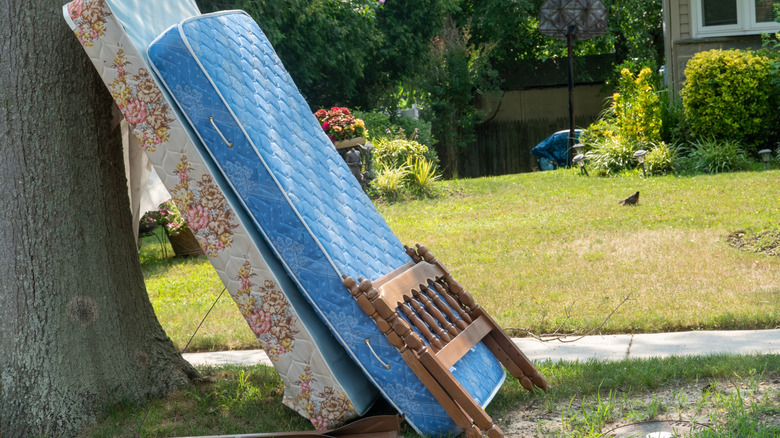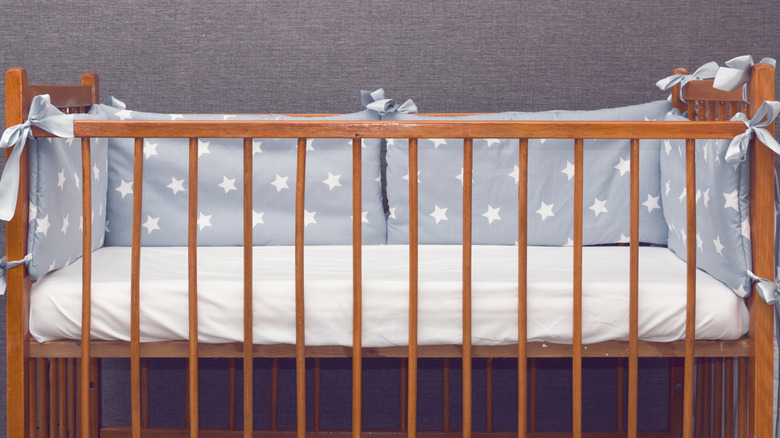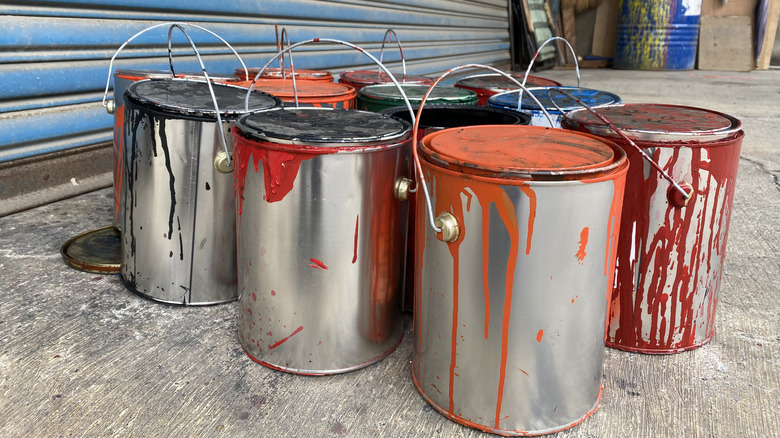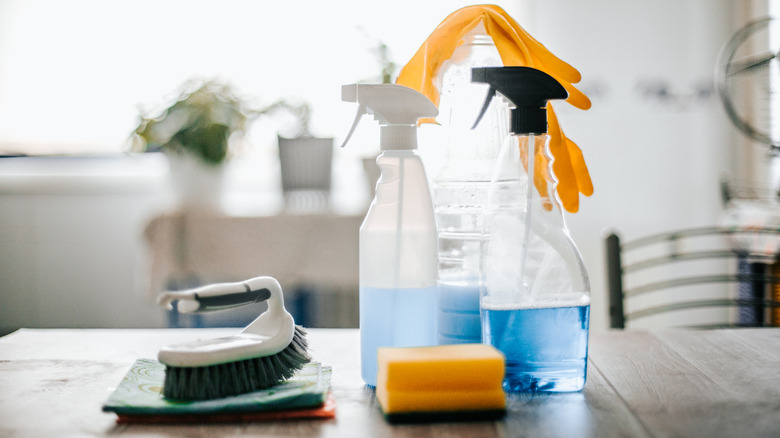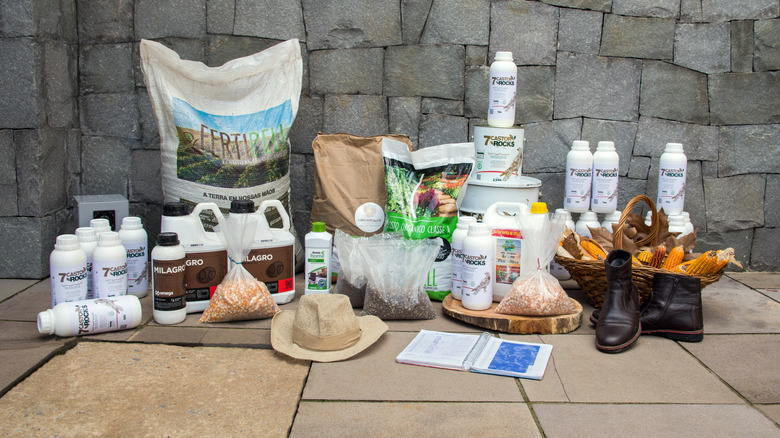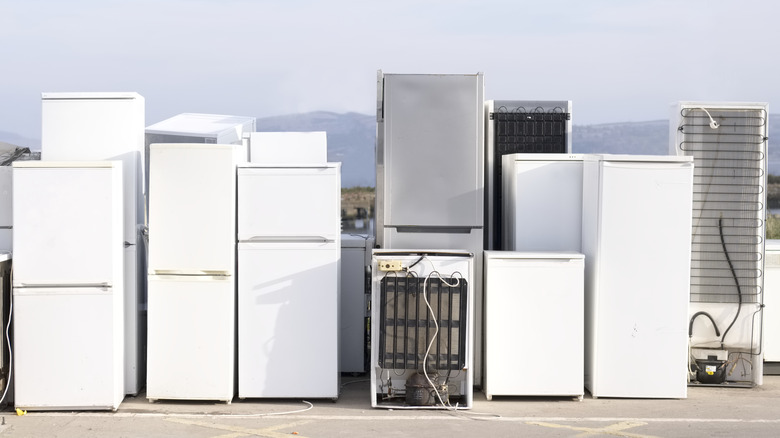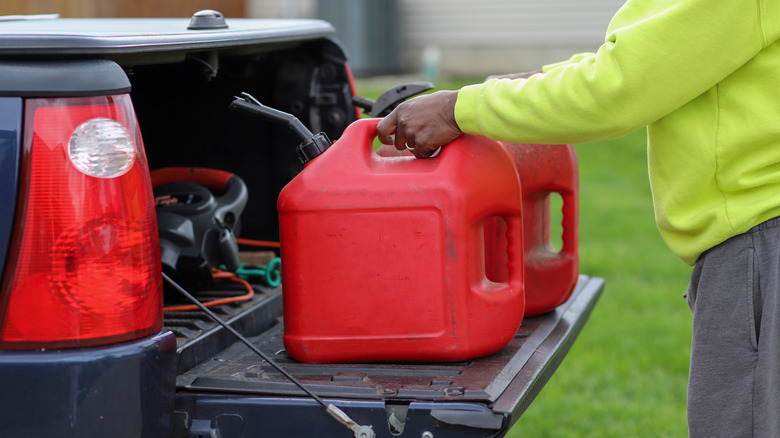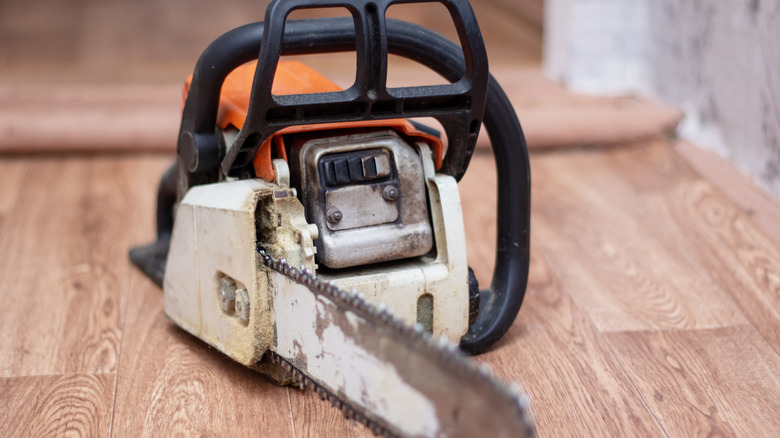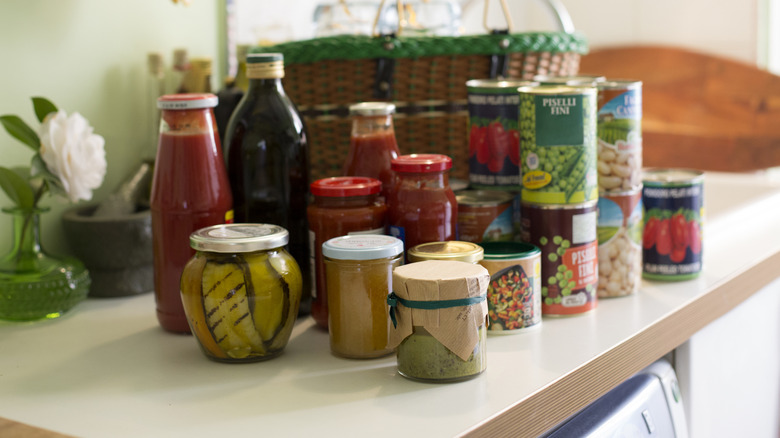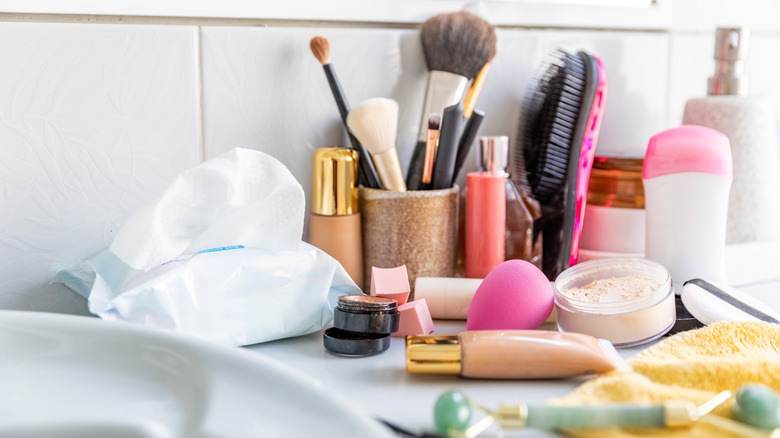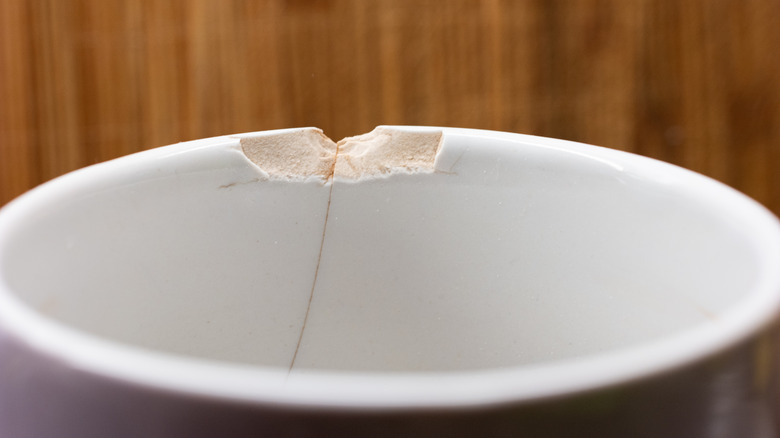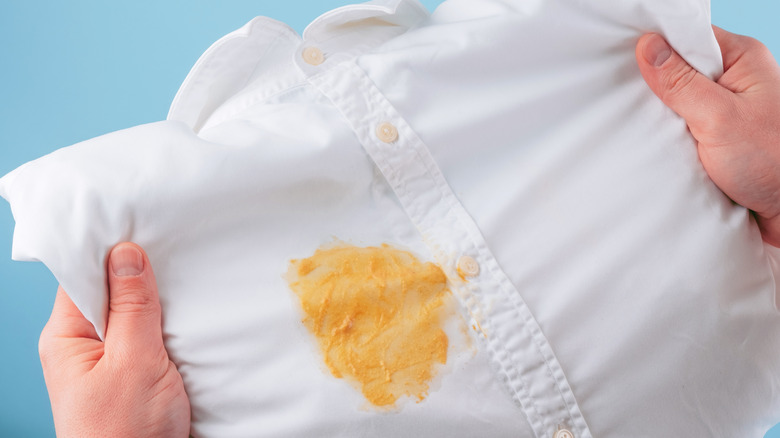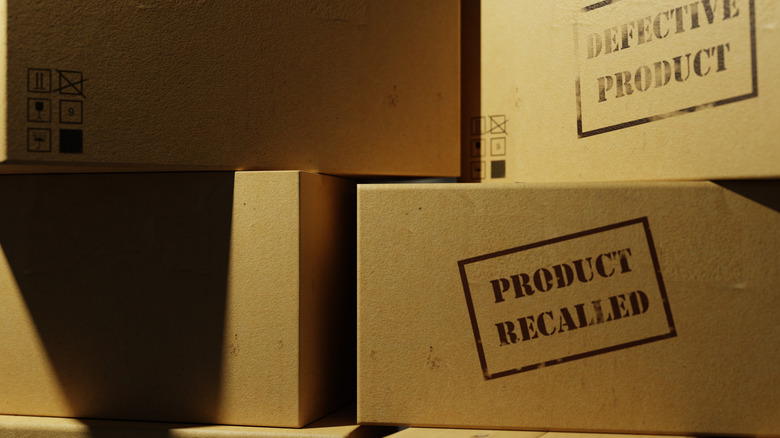15 Things You Shouldn't Be Donating To Thrift Stores (And What To Do Instead)
Sometimes, it's hard to know what to put in the keep, toss, and donate pile when decluttering your home. After all, one man's trash is another man's treasure, so something useless to you could be the perfect style for someone else or be the final piece they need in a project. However, it's important to be mindful of what you are donating. Sifting through the donation boxes can be extremely time-consuming for the staff, and they typically don't have the supplies to repair or clean everything that comes to the store. Additionally, make sure to keep the workers in mind when arranging your things. For example, you don't want to put loose kitchen knives hidden under a pile of sweaters or have a box of uncushioned breakables.
When in doubt, consider, "Would I feel comfortable offering this to a friend or neighbor?" If the answer is no, then it may not be in the best condition to pass on to others. That said, some items can be clean and work perfectly fine, but will be refused for other reasons. Luckily, there are several alternatives to thrift store donations to get rid of things after decluttering. Some items can be repurposed around the home, others can be sold on an online marketplace, and some things are better suited for other specialized programs. If you're unsure whether an item is worth donating or aren't sure how else to get rid of it, this list, which includes baby furniture, household cleaners, and large appliances, will guide you through your best options.
Mattresses and box springs
Even if your mattress or box spring is in good condition, many thrift stores won't take them. They're bulky, hard to maneuver, and take up a lot of space for an item that most people aren't interested in purchasing secondhand. Additionally, they're susceptible to pests, like bed bugs, and most places don't want to risk spreading an infestation in the store. Rather than donating, see if there is a mattress recycling program in your area. If you must dispose of it, schedule a bulky trash pickup through your city's waste management service.
Baby furniture and car seats
Goodwill and other thrift shops typically won't accept baby furniture or car seats because it's tricky to know if they meet safety regulations. Safety standards are constantly changing, and it's illegal to sell any items that don't meet them. For example, drop-side cribs used to be common, but are now banned because of the dangers they pose to infants, and car seats can be expired or have hidden damage from accidents. If older or recalled, there are clever ways to repurpose old cribs and other items into new furniture to keep them out of the landfill.
Leftover paint
Sometimes, you only need 1/4 of the paint can to finish your project, and it's hard to let the rest go to waste. However, paint, paint thinner, and similar items are flammable and considered household hazardous waste, so they cannot legally be resold at thrift shops. Mix latex paint with cat litter to dry it out before throwing it away. Oil-based paint needs to be taken to a drop-off center, so check with local officials for the appropriate steps. If you want to repurpose leftover paint, you can use it on canvases, plant pots, or for other crafts.
Household cleaners
If you didn't like a certain cleaning brand or no longer use it, you can't add it to your box of donated goods. Household cleaners are considered hazardous materials, and even eco-friendly or green alternatives may contain chemicals that pose health risks. It's another type of product that can also be flammable, so they can't safely sell it in their stores. Rather than donating, ask your family or friends if they can use them or dispose of them properly. If the chemicals can't be safely disposed of, take them to a permanent household hazardous waste collection facility.
Lawn chemicals
Lawn chemicals like pesticides, fertilizers, and similar gardening treatments will almost always be turned down by thrift shops. These are also items that are categorized as hazardous materials, as they can be poisonous, flammable, or environmentally harmful. Even bug sprays can fall into this category, so when it comes to outdoor products, it's best to play it safe and skip donating them. Check with your neighbors to see if they're dealing with the same pests, and if so, give the products to them. Never pour these chemicals down the drain, and follow any disposal instructions on the label.
Old televisions and CRT monitors
Those heavy, boxy TVs and computer monitors with cathode ray tubes (CRTs) are generally not accepted by thrift stores anymore. Not only are they not a best-selling item, but older electronics can contain toxic chemicals, like lead and mercury, and often require special handling. Dumping tube TVs and monitors in the trash creates the risk of these chemicals being released into the environment, so it's best to find an EPA-certified electronics recycler in your area. Alternatively, you can contact your solid waste management district office to see what the disposal options are.
Large appliances
While many families would be delighted to find a refrigerator at the local thrift store, most shops won't accept large appliances. Moving large, bulky items is challenging enough, but such appliances also need to be tested or may contain hazardous materials. If you've ordered a new appliance, it may be worth asking the company if they can take the old one. For appliances that are in good condition, you can try selling on an online marketplace or to scrap buyers. The last resort should be recycling, as it can be illegal to dump large appliances.
Fuel or fuel containers
Gas cans or any type of fuel, including gasoline, diesel, and kerosene, should not be donated. Things like propane tanks for grills, butane canisters, or camping fuel cylinders are other items that are considered hazardous. Plus, gasoline that sits around for long periods typically deteriorates and can cause equipment issues if used, and there's no way to know how old it is. Never dump out old gasoline or other fuel; instead, it's best to take it to a hazardous waste disposal center to be properly disposed of.
Gas-powered outdoor equipment
Just like gas itself isn't accepted at thrift stores, lawn mowers, weed eaters, chainsaws, and other gas-powered equipment are usually not acceptable donations either. Because they may contain fuel, they can be messy or dangerous to have in the shop. Plus, because they're often old and outdated by the time they get there, and there's no way to test them before buying, they're not worth the hassle of selling. If your lawn equipment still works, you can sell it locally or give it to a neighbor. For older equipment, you can often sell it as scrap metal.
Food
If you're the type of person who wants to help the less fortunate, donating food seems like a great way to do so. While it may seem like food in jars or other sealed containers would be good to go, unfortunately, none of it can be sold in most thrift stores. Most second-hand shops don't have a license to handle food, and legally cannot place it on their shelves. Instead, donate canned goods, pantry staples, and other non-perishables to a local food pantry where they can be put to use.
Opened personal care items
Although most thrift shops will gladly accept unused, sealed beauty or personal hygiene products, they likely won't take anything that's been opened. Even if you never used it, there's always a risk of contamination with open containers, and they can't be sure it wasn't tampered with. If you don't want your products to go to waste, you can find uncommon uses for shampoo and other items around the house. For example, soaps and shampoos can work well for cleaning hair or makeup brushes, and old nail polish can become color-coding paint for keys and other items.
Broken or damaged items
With simple DIY thrift flips being a common trend, you may think crafty buyers can find a way to turn that damaged item into something new and beautiful. While some thrift stores will gladly recycle the items for you, other shops strongly urge people to avoid giving them anything that's broken or damaged. Chipped glass and other sharp materials could injure the workers as they sift through the boxes, so it's not worth the risk of donating. In other cases, ask beforehand if they accept damaged items or take the broken materials to a recycling center.
Items with missing pieces
Similar to broken or damaged items, some thrift stores will recycle items with missing parts or pieces, while others will deem them as unusable and turn them away. However, you should never donate something without letting the staff know first, to prevent shoppers from accidentally purchasing something they can't use. First, ask if your location accepts products with missing parts. Then, tell them what the item is, and which pieces are missing. If there aren't any thrift stores that will accept it, do your best to repurpose or recycle it.
Dirty or stained items
Stained, dirty, or weathered items are unlikely to sell at a thrift store, so they won't want to put them on the shelves. If something has discoloration or smells off, you probably wouldn't give it to a friend, and therefore, you shouldn't drop it off at the thrift store, either. There are many clever ways to repurpose old bed sheets, towels, clothes, and other linens, like cutting them up into cleaning rags or making a pet bed. For larger items, like furniture, you can either refurbish it or recycle it through a bulk waste collection program.
Recalled products
Never donate any products that have been recalled, as they can pose a serious risk to potential shoppers if the staff accidentally put them for sale. That said, they'll almost always turn them down, as it's illegal to sell recalled items. Things like exercise equipment, furniture, kitchen appliances, and other goods can be extremely dangerous, even if you haven't seen any issues with them. Check recall notices before donating any item, and call the company for instructions. Oftentimes, they'll offer you a refund or exchange and have you either return it or properly dispose of it.

